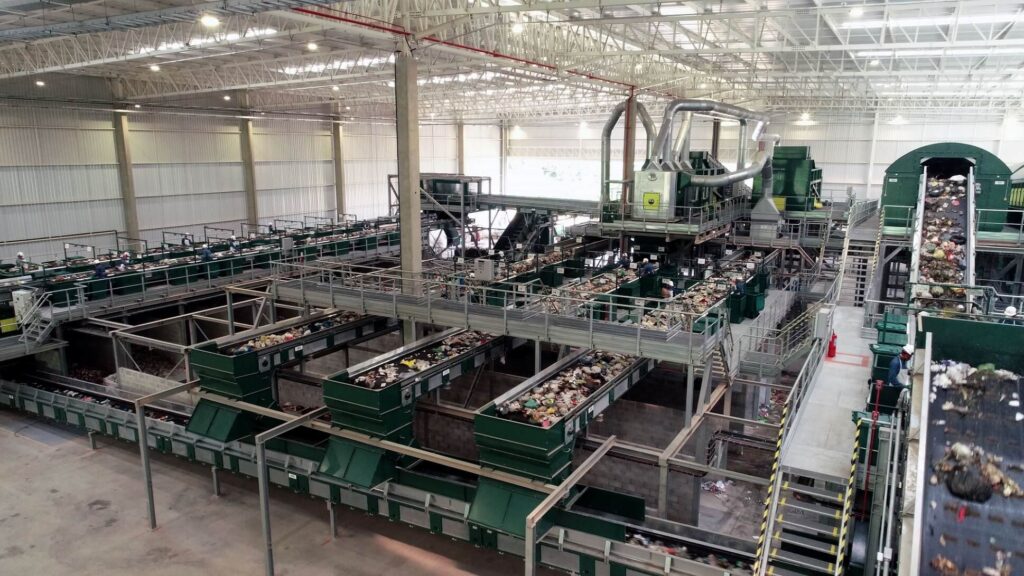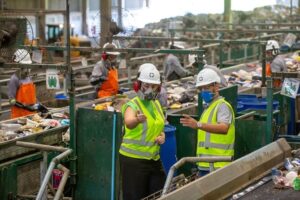
Brazil is a country of continental dimensions. With diverse biomes, cultures, and structures, the challenges of waste management in the country are numerous, causing environmental, social, and economic impacts.
However, with the advancement of green technologies, the development of waste recovery companies, and the implementation of circular economy practices in Brazilian legislation, not only are the challenges becoming clearer, but solutions are also closer at hand.
Solid Waste Management Overview in Brazil
The ABREMA (Brazilian Association of Waste and Environment) releases an annual overview with key data from the sector. In 2024, it was revealed that 41% of urban solid waste (RSU) was disposed of improperly.
Although 2024 was the year when the closure of landfills was expected in Brazil, the National Sanitation Information System (SNIS) revealed the existence of 1,572 open-air landfills in the country and 598 irregular landfills. This reality occurs mainly due to a lack of financial resources for the sector.
Although these numbers are concerning, the 2024 Overview showed positive data, such as the increase in the circular economy in the management of urban solid waste. 59% of waste that is correctly disposed of is gradually being directed to a chain that will reuse the material.
The report highlights solutions such as composting, coprocessing, and recycling as conscious, environmentally correct, and economically viable alternatives.
Main Challenges of Solid Waste Management in Brazil
Understanding the main challenges of Solid Waste Management in Brazil is essential for finding the most suitable solutions.
Improper Waste Disposal
More than 41% of waste is disposed of improperly, such as in landfills, burning, or irregular burial. This number highlights the importance of increased inspection, as well as education and incentives for proper disposal.
Low Recycling Rate and Dependence on Informal Labor
Although the country, in 2024, correctly disposed of 59% of waste, only 8.3% was sent for recycling.
Additionally, 67% of waste is recycled through informal collection by independent waste pickers, with little infrastructure, support, and financial return.
Lack of Data and Control
The lack of technology and inspection means that many data are still estimates, especially about informal collection and material recovery, making it difficult to plan and monitor public policies effectively.
Regional Inequalities
The North and Northeast regions show the worst rates of waste collection and proper disposal. In the North region, for example, only 38% of waste goes to sanitary landfills.
These numbers indicate a lack of infrastructure and investments in the most vulnerable regions.
High Costs and Low Efficiency
Brazilian municipalities spent R$ 37 billion on urban solid waste management in 2023, according to ABREMA. The highest per capita cost is in the Southeast, but still, the results do not match the investments proportionally, indicating the need for more efficient local solutions.
Low Valuation of Organic Waste
Despite the increase in the valuation of organic waste, this number is still small. Only 0.06% of generated waste goes for coprocessing and 0.4% goes for composting (Source: ABREMA).
Low Adoption and Structure for Reverse Logistics
Although there are reverse logistics systems for more than 13 types of products (such as tires, electronics, and medicines), the efficiency varies greatly by region, and many still operate with low coverage or recovery rates.
Lack of Integration with Circular Economy
Brazil is still transitioning from a linear model (extract-produce-dispose) to a circular model. There is a lack of incentives, infrastructure, and education for waste valuation.
Limited Social Participation and Environmental Education
The engagement of companies and the population in conscious consumption actions and proper waste separation is still low, and there are few options for continued environmental education.
Paths to the Solution
Despite the complexity of the challenges, the waste sector presents a great potential for improvements and economic opportunities. Regional actions, considering local realities, are essential for progress.
For example:
- In large cities, with little space for landfills, energy recovery plants may be the best alternative.
- In agricultural regions, with high organic waste production, biogas and biomethane plants are highly efficient and sustainable.
To transform this scenario, information, investment, inspection, effective public policies, and active social participation are necessary.



